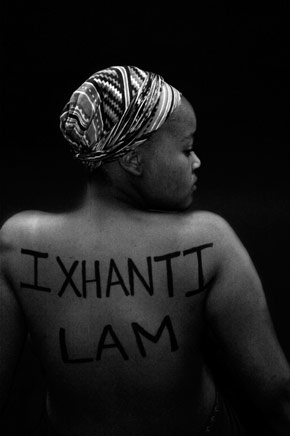
Source: Port Alfred Bureau, Dispatch (David Macgregor)
Picture: SAMANTHA CLAASEN
A thought-provoking photographic exhibition featuring more than 150 naked women – with anti-gender violence messages plastered across their bare bodies – has got Grahamstown talking.
Started last year by a group of Rhodes University gender activists, the latest instalment of the My Body, My Choice exhibition attracted 78 women participants – from a 46-year- old professor to fresh-out-of-school 18-year-old students.
Inspired by an iconic collection of naked images of famous women – published in Marie Claire magazine about two years ago – organiser Beth Vale said campus gender activists decided to use the concept to do something positive to address societal stereotypes of women.
“We thought, wouldn’t it be fantastic if we could get real women, who aren’t celebrities, to do a photographic exhibition that sought to reclaim and re-signify the woman’s body?”
Now in its second year, the exhibition – of projected images accompanied by dialogue – has also been a very liberating experience for the women who agreed to be photographed.
Rhodes student services officer Larissa Klazinga – who worked with Vale on the project – said although plans are afoot to use the images in a more permanent format – such as a book or online – organisers worried that they might be used to further exploit male stereotypes of women. “We do not want to separate the woman in the image from the message they are portraying … women should never just be an image.”
Klazinga said any use of the images – obviously with consent – had to be accompanied by a narrative explaining why the person took part. “There should be nothing sexual about naked women … change happens by pushing the boundaries.”
With Grahamstown experiencing the same daily problems as women across the country, Vale said finding volunteers was not a difficult process, “They came in droves … we had 90 last year and 78 this year. The astounding response we got is not only testament to the commitment and courage of these women, but also the extent to which they identify with the struggle against gender-based violence.”
According to Vale, Grahamstown women – including students – felt “vulnerable or afraid” because of a high incidence of rape, sexual assault and domestic violence in the City of Saints. “Being treated as a sexual object is something that almost every woman experiences.
“Like many other places in South Africa, rape survivors do not see justice through the court system and far too many rape cases are indefinitely postponed. "According to Klazinga, one of the first questions asked of rape survivors is “what were you wearing?”
“This is not relevant … in sexual crimes there is a perception that women did something to deserve it.” University spokesman Lebogang Hashatse said it was important “to recognise that not only in the university setting but throughout South Africa as a nation we have had to deal with many different forms of oppression, some that have in particular affected women and children”.
“We at Rhodes University strongly believe it is necessary and critical that we create spaces to allow activism against these oppressions to take place. Activism against all forms of women abuse and marginalisation is therefore encouraged so that students at this university go into the world with a more healthy and progressive sense of value for women and gender relations.”
Comments from participants included this from Shelley Roberts: “Every woman is somebody’s daughter, sister, mother or lover. Every woman is beautiful. Every woman deserves love and RESPECT.”
And from Unathi Lugongolo: “My body is not a commodity that can be sold, abused and used. I say so.”
Although the exhibition at the Nun’s Chapel on campus runs until the end of Women’s Day on Monday (August 9), organisers are looking to extend its Grahamstown run – and also to take it to other major centres such as Cape Town and Johannesburg.
